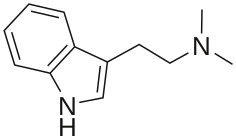| Part of a series on |
| Psychedelia |
|---|
 |
A psychedelic experience (known colloquially as a trip) is a temporary altered state of consciousness induced by the consumption of a psychedelic substance (most commonly LSD, mescaline, psilocybin mushrooms, or DMT).[citation needed] For example, an acid trip is a psychedelic experience brought on by the use of LSD, while a mushroom trip is a psychedelic experience brought on by the use of psilocybin. Psychedelic experiences feature alterations in normal perception such as visual distortions and a subjective loss of self-identity, sometimes interpreted as mystical experiences. Psychedelic experiences lack predictability, as they can range from being highly pleasurable (known as a good trip) to frightening (known as a bad trip). The outcome of a psychedelic experience is heavily influenced by the person's mood, personality, expectations, and environment (also known as set and setting).[1]
Researchers have interpreted psychedelic experiences in light of a range of scientific theories, including model psychosis theory, filtration theory, psychoanalytic theory, entropic brain theory, integrated information theory, and predictive processing. Psychedelic experiences are also induced and interpreted in religious and spiritual contexts.